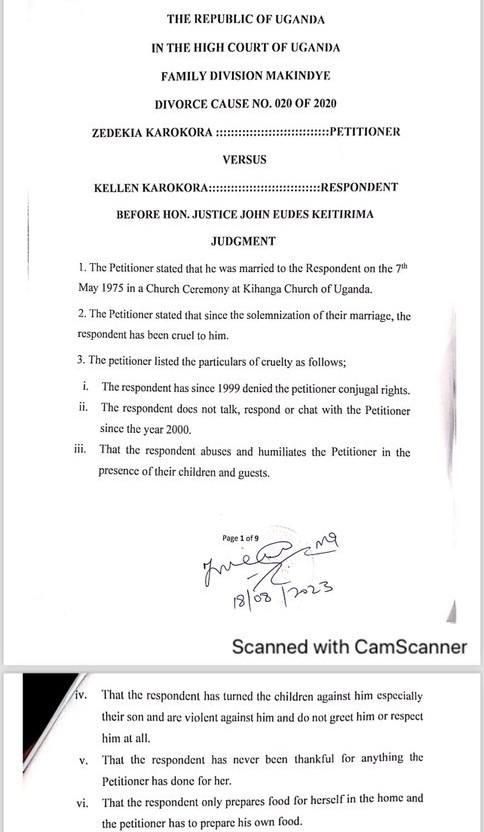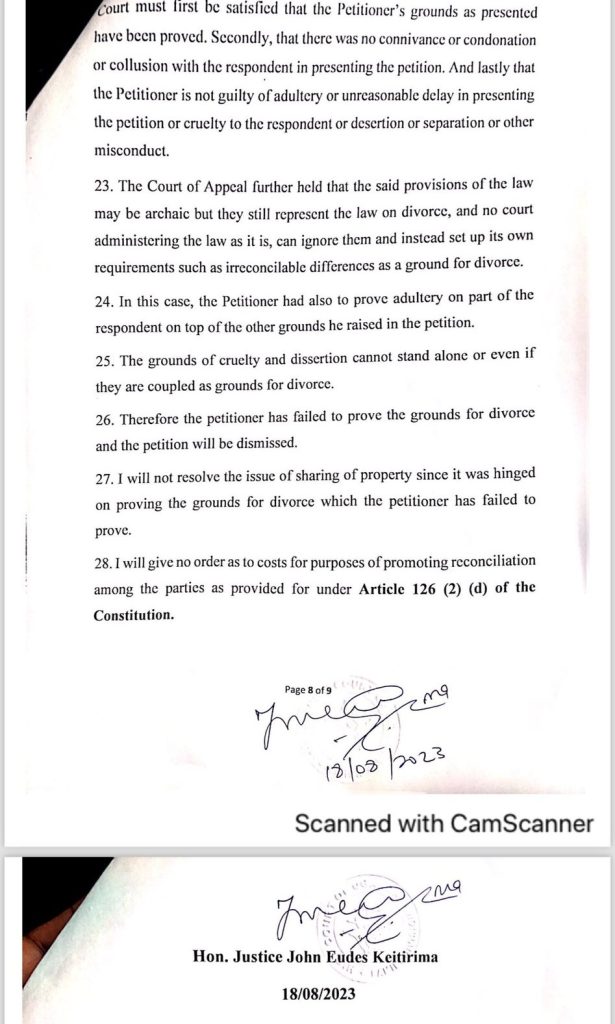Challenge to the Rule: A Closer Exam of the Zedekia v. Kellen Karokora Case “No Adultery, No Divorce”

In a recent legal development that has sparked debates and discussions, the case of Zedekia Karokora v Kellen Karokora has established a fairly unique precedent in divorce processes, sparking debates and discussions.
In this case, Divorce Cause No. 020 of 2020, Justice John Eudes Keitirima held that in the absence of proven adultery, a husband cannot obtain a divorce from his wife merely on charges of cruelty and desertion.

This ruling has raised eyebrows and highlighted concerns about the complexities and subtleties of divorce legislation, as well as the role of dishonesty in determining marriage separation.
The case revolves around a husband’s attempt to divorce his wife on the grounds of cruelty and desertion. The husband argued that he had suffered both emotional and physical cruelty from his wife and that she had abandoned the marital home, thus leading to the breakdown of their marriage.
However, the pivotal point of contention arose when the husband failed to provide evidence of adultery on the part of his wife.
In his pleadings before the court, Mr. Zedekiah Karokora said he married Kellen Karokora on May 7th,1975, in a church ceremony at Kihanga Church of Uganda. He told the court that since the solemnization of their marriage. Mrs. Karokora has been cruel to him.
Justice John Eudes Keitirima’s ruling has established a precedent that departs from the norm in divorce cases. Traditionally, cruelty and desertion have been recognized as valid grounds for divorce in many jurisdictions. However, this ruling underscores the significance of proving adultery, even in cases where cruelty and desertion are evident.
“Even if in this evidence the petitioner (husband) could have proved cruelty and desertion on the part of the respondent, those grounds are alone not sufficient to dissolve a marriage” the Judge ruled, adding that the husband had not proved adultery on the part of his wife
The ruling prompts a deeper examination of the legal principles at play. Adultery has historically been considered a breach of the marital contract and a contributing factor to the dissolution of a marriage. It often plays a crucial role in establishing irretrievable breakdowns and justifying divorce.
However, the Zedekia Karokora v Kellen Karokora case challenges the assumption that adultery is an essential element in all divorce cases.
This precedent-setting decision has sparked various debates and criticisms within legal circles. Some legal experts argue that the ruling places an undue burden on the spouse seeking a divorce, particularly in cases where the other spouse’s actions have caused significant emotional or physical distress.
Critics contend that prioritizing the need to prove adultery could potentially perpetuate unhealthy marriages, as spouses may feel compelled to remain in undesirable situations due to the absence of evidence of adultery.
The case also raises questions about societal perceptions and gender dynamics. By emphasizing the role of adultery in divorce, the ruling could inadvertently perpetuate harmful stereotypes and disproportionately impact certain individuals. In some cases, this might disadvantage victims of cruelty or abandonment who lack evidence of adultery but still deserve the option of divorce.
 The Zedekia Karokora v Kellen Karokora case has opened discourse on the complexities of divorce laws and their intersection with societal norms. It invites a reconsideration of how divorce proceedings are approached, particularly when weighing the significance of different grounds for divorce. Legal experts, lawmakers, and advocacy groups may need to engage in a comprehensive dialogue to ensure that divorce laws remain equitable and just for all parties involved.
The Zedekia Karokora v Kellen Karokora case has opened discourse on the complexities of divorce laws and their intersection with societal norms. It invites a reconsideration of how divorce proceedings are approached, particularly when weighing the significance of different grounds for divorce. Legal experts, lawmakers, and advocacy groups may need to engage in a comprehensive dialogue to ensure that divorce laws remain equitable and just for all parties involved.
Grounds of Divorce ;
A husband or wife is eligible to file a petition with the court to terminate a marriage, based on certain valid grounds. These grounds encompass situations where, following the marriage ceremony, if his wife or husband:
(a) Engaged in adultery.
(b) Underwent a change of religious affiliation.
(c) Committed bigamy.
(d) Committed acts of rape, sodomy, or bestiality.
(e) Manifested cruelty or abandoned the marital relationship.
(Source: Modified section 4 of the Divorce Act.)
Conclusion
The Zedekia Karokora v Kellen Karokora case has undoubtedly set a distinctive precedent by underscoring the importance of proving adultery in divorce cases. While it may challenge conventional legal wisdom, it also provides an opportunity to reevaluate the legal framework surrounding divorce and its implications for individuals seeking to end their marriages.
As discussions continue, it remains to be seen how this ruling will shape future divorce proceedings and the broader conversation on marriage dissolution




